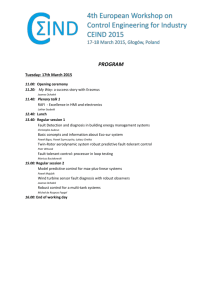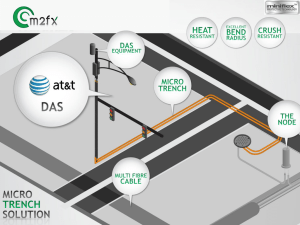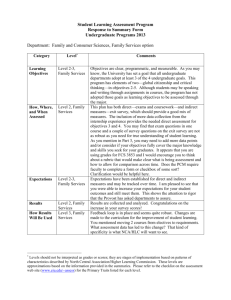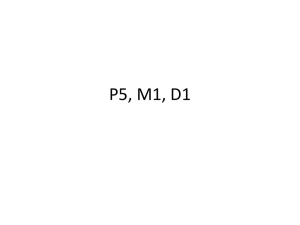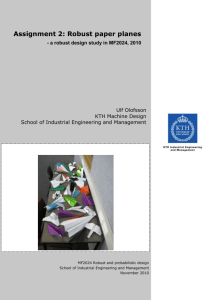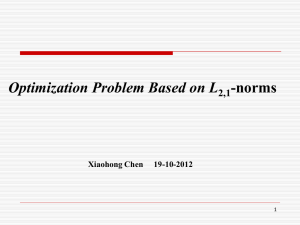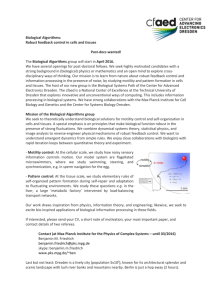Peter Zongwane Primary School Construction Report
advertisement
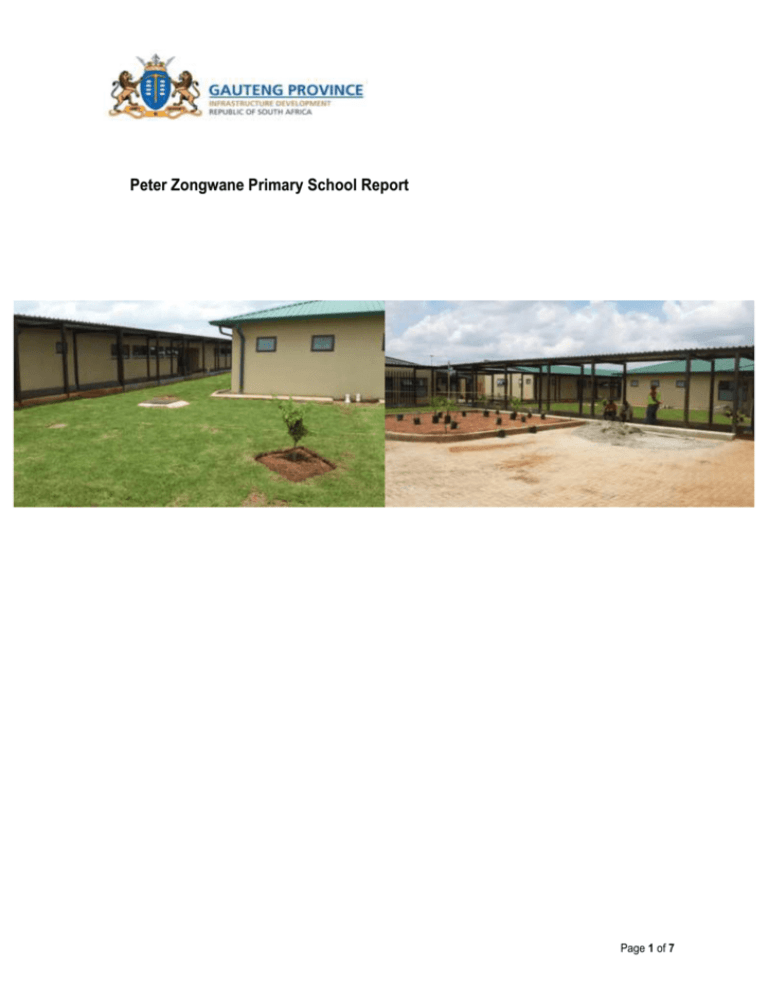
Peter Zongwane Primary School Report Page 1 of 7 DATE: 03 SEPTEMBER 2014 VERSION 1 Table of Contents 1.0 BACKGROUND ......................................................................................................................................... 3 2.0 PROJECT INFRORMATION...................................................................................................................... 3 3.0 SCOPE OF WORK .................................................................................................................................... 3 4.0 JOB CREATION ........................................................................................................................................ 4 5.0 GREEN PRINCIPLES ................................................................................................................................ 4 6.0 CHALLENGES ........................................................................................................................................... 4 7.0 TECHNOLOGY USED ............................................................................................................................... 5 8.0 MATERIALS USED FOR THE CONSTRUCTION OF THE SCHOOL ....................................................... 7 Page 2 of 7 1.0 BACKGROUND The project for the construction of Peter Zongwane Primary School in Phomolong is among the construction of 4 new schools on the IDT School Programme. Phomolong is located in the area Tembisa, which falls under Kempton Park in the Ekurhuleni Metropolitan Municipality in Gauteng. All of the blocks in the school are constructed utilising Alternative Construction Technologies. The Alternative Construction Method used is the Robust System. The primary purpose of this report is to inform and indicate to The Gauteng Province Department of Infrastructure Development the ongoing progress and status of the Construction of Peter Zongwane Primary School. The report will reflect all work in progress and provide details on the activities that will take place over the upcoming period, which will be undertaken by the Independent Development Trust. The focus continues to be project progress and delivery. 2.0 PROJECT INFRORMATION CLIENT IMPLEMENTING AGENT CONTRACTOR ORIGINAL CONTRACT AMOUNT ADJUSTED CONTRACT AMOUNT SITE HANDOVER DATE COMMENCEMENT DATE ORIGINAL CONTRACT COMPLETION DATE ACTUAL COMPLETION DATE SITE LOCATION TYPE OF CONTRACT GAUTENG PROVINCE, DEPARTMENT OF INFRASTRUCTURE DEVELOPMENT INDEPENDENT DEVELOPMENT TRUST (IDT) SHOES MOSHOEU HOLDINGS R 33 430 330.06 R 40 022 911.28 24/08/2012 14/10/2012 23/04/2013 18/07/2014 TEMBISA, KEMPTON PARK, EKURHULENI METROPOLITAN MUNICIPALITY JBCC CONTRACT 3.0 SCOPE OF WORK The following are to form part of the scope of works: Administration Block Intermediate Classrooms Block consisting of 9 Classrooms Grade R Classrooms Block consisting in 3 Classrooms Foundation Classrooms Block consisting of 8 Classrooms Senior Grade 7 Classrooms Block consisting of 6 Classrooms Sports Facilities Page 3 of 7 Guard House Refuse Yard Parking and Paving Walkways and Yard walls Steel Palisade Fence Soccer field Paved Netball Court 4.0 JOB CREATION Male: 59 Female: 6 Youth: 31 Local Sub Contractors: 8 5.0 GREEN PRINCIPLES The construction of the attenuation tank for irrigation of the landscaping to minimise the use municipal water. The installation of obscure high level windows to reduce heat and sun glare in the classrooms. Fibreglass Sheeting installed for adequate sound and thermal insulation. Installation of Solar Powered Geyser 6.0 CHALLENGES 7.1 Contractual Issues Delays in the project was where due to the below mentioned issues The relocation of the sports facility belonging to the community delayed the start of the project from the onset. Page 4 of 7 The contractor encountered numerous payment delays which led to suspension of works. Rainy weather conditions Delays in SDP approvals Execution of additional work The Contractor has submitted a revised programme and has acknowledged delays to their previous programme Due to a shooting incident on the site, we have advised the contractor to refrain from working after hours; this will however have an effect on the practical completion date. Revised practical completion date is 04 July 2014 The Carpentry and Joinery material has been cut to design and size and delivered to site. Carpentry and Joinery installation pace is a concern – Recommend the sub-contractor to increase the workforce on site 7.2 SDP Approval Status SDP has been approved by the Ekurhuleni Metropolitan Municipality. Municipal Water, Sewer and Electrical connections have been made on site to the Contractors account and require to be transferred to GDE at Practical Completion. Department Infrastructure Development has advised the Contractor that the Principal of Peter Zongwane Primary School is required to transfer the account to GDE. This is currently being addressed. Currently the Deed of sale agreement has been issued to council for the approval of plans. The Plans are currently with the Executive Manager of Building Control (Ekurhuleni Metropolitan Municipality), Mr Broderick Chiloane for final signatures. Procurement of the school furniture is on-going – anticipating delivery at Practical Completion The process for the confirmation of the school name is ongoing 7.0 TECHNOLOGY USED The alternative construction method used at the Peter Zongwane Primary School is called the Robust Building System The walls of the ROBUST Building System are constructed with factory-produced expanded metal panels to which mortar is applied to both faces of the expanded metal panels to form the core structure of the wall. Mortar is applied to the panels mechanically and can be applied wet (pumped with ROBUST mortar machine) or dry Page 5 of 7 (pumped with a gunite machine) The core can then be scratched for a rough finish or plastered to both faces for a smoother finish to complete the system. Core can also be tiled or cladded for a preferred finish. The ROBUST system has a proven track record. The system has been awarded Agrément South Africa, SABS accreditation and has also been approved by NHBRC and the Dade County Building Code, Miami in the USA, which is recognized as one of the most stringent building codes in the world. 7.1 Properties of the Robust Building System i. Fire Rated The fire performance of the robust system is classified as Type FR, which is non-combustible, and has a fire resistance rating of 60 minutes. ii. Fast track construction Due to the ROBUST technology, walls are assembled at a rate of 20m2/hour per jig. Mortar and plaster is mechanically applied, speeding up the process even more. No time is spent on beam filling due to trusses being recessed into wall structure. A manpower team of 74 labourers can deliver 1 x 85m2 ROBUST house per day by manually mixing on site and creating a smooth plaster finish. A manpower team of 51 labourers can deliver 1 x 85m2 ROBUST house per day utilizing a batch plant with a scratch plastered finish. iii. High quality wall finishing Wall is straight with smooth surfaces. iv. Versatility The ROBUST system can be adapted to meet any building design. It can also incorporate any style of window, door, roof or finish. Due to its flexibility, curved and any other shaped walls can be built using this system. The system can be used to do building alterations to existing brick structures. ROBUST columns can be erected by hand in 20 minutes without the requirement of shuttering. Columns can be formed into any shape v. Cleaner and safer construction The ROBUST core is a light weight structure. It weighs 3,5kg/m2 and is extremely easy to handle. The ROBUST jigs provide an easy hassle free assembly and erection process. Mortar is mechanically applied to structure. 95% of the workforce utilized in the ROBUST structure is local unskilled labour, including youth & women. vi. Increased living space The ROBUST external walls are 115mm and internal walls 90mm thick whereas conventional external walls are 260mm and 150mm for internal walls. In coastal areas within 15km from the sea, ROBUST external walls are 130mm thick. Internal walls remain 90mm thick. (On a standard 85m2 dwelling you gain an additional 7m2 of floor area) vii. Thermal insulation Page 6 of 7 The thermal performance (done with insulated ceilings) is similar to brick in low humidity areas of 1°C which is better than brick in high humidity areas. viii. Sound Insulation The acoustic performance for the ROBUST system is 46db-49db airborne sound insulation between adjoining rooms on a 90mm thick internal wall. 7.2 Comparison between Robust system and Brickwalls Robust vs. Conventional Construction The way the system fits together makes the ROBUST structure a monolithic system, something not possible with conventional building systems. The ROBUST structure wall is far superior to conventional walling systems such as brick and block and alternative systems, as it is virtually impossible to break in through the wall. Robust is more durable than conventional structures. It is similar to brick but better than brick by applying waterproof sealer to external walls. The robust system is similar to brick in low humidity areas and resistant to water penetration and rising damp. 8.0 MATERIALS USED FOR THE CONSTRUCTION OF THE SCHOOL Below are materials used on the project. ELEMENT MATERIALS Sub-structure Concrete; Reinforcement Superstructure Light steel frames (metal studs) Mesh, light weight concrete; nails Roofing Chromadeck roof sheets Carpentry Pigeon holes, cupboards, doors Ironmongery and Joinery Three lever locksets, indicator bolts, toilet paper roll holders Metalwork Door frames, aluminum window frames Plumbing and Sanitation PVC pipes, Wash hand basins, vandal proof water closets, copper piping, water taps Page 7 of 7
